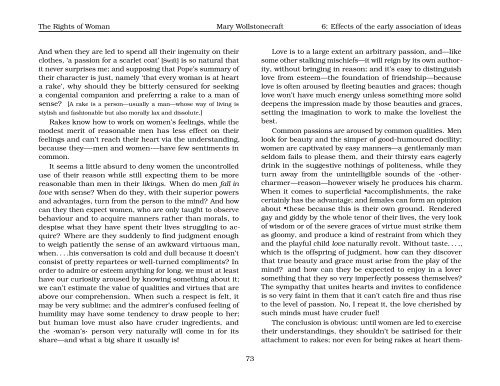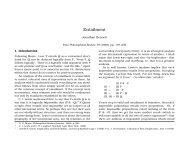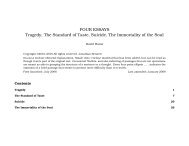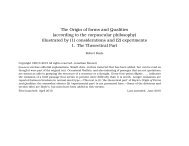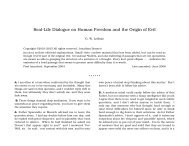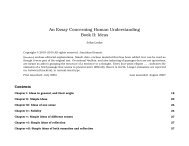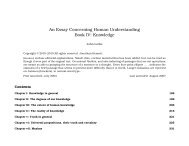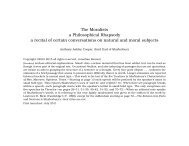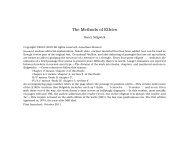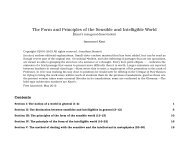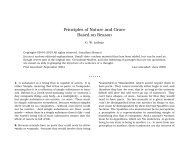A Vindication of the Rights of Woman with - Early Modern Texts
A Vindication of the Rights of Woman with - Early Modern Texts
A Vindication of the Rights of Woman with - Early Modern Texts
You also want an ePaper? Increase the reach of your titles
YUMPU automatically turns print PDFs into web optimized ePapers that Google loves.
The <strong>Rights</strong> <strong>of</strong> <strong>Woman</strong> Mary Wollstonecraft 6: Effects <strong>of</strong> <strong>the</strong> early association <strong>of</strong> ideas<br />
And when <strong>the</strong>y are led to spend all <strong>the</strong>ir ingenuity on <strong>the</strong>ir<br />
clo<strong>the</strong>s, ‘a passion for a scarlet coat’ [Swift] is so natural that<br />
it never surprises me; and supposing that Pope’s summary <strong>of</strong><br />
<strong>the</strong>ir character is just, namely ‘that every woman is at heart<br />
a rake’, why should <strong>the</strong>y be bitterly censured for seeking<br />
a congenial companion and preferring a rake to a man <strong>of</strong><br />
sense? [A rake is a person—usually a man—whose way <strong>of</strong> living is<br />
stylish and fashionable but also morally lax and dissolute.]<br />
Rakes know how to work on women’s feelings, while <strong>the</strong><br />
modest merit <strong>of</strong> reasonable men has less effect on <strong>the</strong>ir<br />
feelings and can’t reach <strong>the</strong>ir heart via <strong>the</strong> understanding,<br />
because <strong>the</strong>y—·men and women·—have few sentiments in<br />
common.<br />
It seems a little absurd to deny women <strong>the</strong> uncontrolled<br />
use <strong>of</strong> <strong>the</strong>ir reason while still expecting <strong>the</strong>m to be more<br />
reasonable than men in <strong>the</strong>ir likings. When do men fall in<br />
love <strong>with</strong> sense? When do <strong>the</strong>y, <strong>with</strong> <strong>the</strong>ir superior powers<br />
and advantages, turn from <strong>the</strong> person to <strong>the</strong> mind? And how<br />
can <strong>the</strong>y <strong>the</strong>n expect women, who are only taught to observe<br />
behaviour and to acquire manners ra<strong>the</strong>r than morals, to<br />
despise what <strong>the</strong>y have spent <strong>the</strong>ir lives struggling to acquire?<br />
Where are <strong>the</strong>y suddenly to find judgment enough<br />
to weigh patiently <strong>the</strong> sense <strong>of</strong> an awkward virtuous man,<br />
when. . . .his conversation is cold and dull because it doesn’t<br />
consist <strong>of</strong> pretty repartees or well-turned compliments? In<br />
order to admire or esteem anything for long, we must at least<br />
have our curiosity aroused by knowing something about it;<br />
we can’t estimate <strong>the</strong> value <strong>of</strong> qualities and virtues that are<br />
above our comprehension. When such a respect is felt, it<br />
may be very sublime; and <strong>the</strong> admirer’s confused feeling <strong>of</strong><br />
humility may have some tendency to draw people to her;<br />
but human love must also have cruder ingredients, and<br />
<strong>the</strong> ·woman’s· person very naturally will come in for its<br />
share—and what a big share it usually is!<br />
73<br />
Love is to a large extent an arbitrary passion, and—like<br />
some o<strong>the</strong>r stalking mischiefs—it will reign by its own authority,<br />
<strong>with</strong>out bringing in reason; and it’s easy to distinguish<br />
love from esteem—<strong>the</strong> foundation <strong>of</strong> friendship—because<br />
love is <strong>of</strong>ten aroused by fleeting beauties and graces; though<br />
love won’t have much energy unless something more solid<br />
deepens <strong>the</strong> impression made by those beauties and graces,<br />
setting <strong>the</strong> imagination to work to make <strong>the</strong> loveliest <strong>the</strong><br />
best.<br />
Common passions are aroused by common qualities. Men<br />
look for beauty and <strong>the</strong> simper <strong>of</strong> good-humoured docility;<br />
women are captivated by easy manners—a gentlemanly man<br />
seldom fails to please <strong>the</strong>m, and <strong>the</strong>ir thirsty ears eagerly<br />
drink in <strong>the</strong> suggestive nothings <strong>of</strong> politeness, while <strong>the</strong>y<br />
turn away from <strong>the</strong> unintelligible sounds <strong>of</strong> <strong>the</strong> ·o<strong>the</strong>r·<br />
charmer—reason—however wisely he produces his charm.<br />
When it comes to superficial •accomplishments, <strong>the</strong> rake<br />
certainly has <strong>the</strong> advantage; and females can form an opinion<br />
about •<strong>the</strong>se because this is <strong>the</strong>ir own ground. Rendered<br />
gay and giddy by <strong>the</strong> whole tenor <strong>of</strong> <strong>the</strong>ir lives, <strong>the</strong> very look<br />
<strong>of</strong> wisdom or <strong>of</strong> <strong>the</strong> severe graces <strong>of</strong> virtue must strike <strong>the</strong>m<br />
as gloomy, and produce a kind <strong>of</strong> restraint from which <strong>the</strong>y<br />
and <strong>the</strong> playful child love naturally revolt. Without taste. . . .,<br />
which is <strong>the</strong> <strong>of</strong>fspring <strong>of</strong> judgment, how can <strong>the</strong>y discover<br />
that true beauty and grace must arise from <strong>the</strong> play <strong>of</strong> <strong>the</strong><br />
mind? and how can <strong>the</strong>y be expected to enjoy in a lover<br />
something that <strong>the</strong>y so very imperfectly possess <strong>the</strong>mselves?<br />
The sympathy that unites hearts and invites to confidence<br />
is so very faint in <strong>the</strong>m that it can’t catch fire and thus rise<br />
to <strong>the</strong> level <strong>of</strong> passion. No, I repeat it, <strong>the</strong> love cherished by<br />
such minds must have cruder fuel!<br />
The conclusion is obvious: until women are led to exercise<br />
<strong>the</strong>ir understandings, <strong>the</strong>y shouldn’t be satirised for <strong>the</strong>ir<br />
attachment to rakes; nor even for being rakes at heart <strong>the</strong>m-


